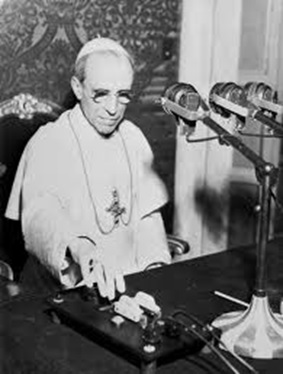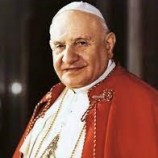On the 22nd of November, 1943, amidst the atrocities of the Second World War, Herzog, the great rabbinical authority of Jerusalem, personally presented to Pope Pius XII his “sincere thanks, as well as his deep appreciation for his welcoming attitude regarding Israel and for his much valued help offered by the catholic church to the endangered Jewish people.” These and other revelations are recorded in the book by Pierre Blet, “Pio XII and the Second World War according to the archives of the Vatican” (Librairie Académique Perrin, 1997). In spite of all this, naturally, there are still many hearsayers who refuse to leave the memory of Pio XII in peace.
The Silence Barrier
During World War II, both in Nazi Germany and in the countries occupied by it, a wall of silence surrounded the people and their consciences. After the war, when the atrocities and violations of human rights came to light, much of the German population had difficulty believing that everything happened in absolute silence.
The Holy See had privileged channels of information, in such a way that Pope Pius XII was well aware of all these war crimes and of the persecutions against the Jewish and Christian people. In the information war, and the game of euphemism, the Nazis spoke of “emigration” and the “final solution” when it should have read “deportation” and “genocide.” By this time in 1942, the Vatican knew that this new phase of “treatment” for the Jewish people included extermination, pure and simple.
That’s when Pius XII decided to speak out. He drew on his broadcast Christmas message (December 1942) to aboard the issue. Immediately, the Nazi government responded: “The Pope blames the German people of injustices against the Jews, therefore he has become the spokesman for the Jewish war criminals.” Pius XII would intervene again in 1943. At the time, even the American “propagandas” who never missed an opportunity to accuse the Germans of war crimes, ever spoke of the death camps. On August 30, 1944, the U.S. Secretary of State said: “There is not sufficient evidence to justify a statement about executions in gas chambers.”
Acting in silence
Observers of the Holy See ran extreme risks to retrieve reliable information about the deported Jews. At times without any public statements, Pius XII began to act. When the German government demanded the return of Jewish refugees in Italy, particularly from Central Europe, the Pope found support in elements of Mussolini’s government, which refused to bend under pressure from Germany. Then, when the Germans conquered Italy, the clergy and Catholic population gave refuge to Jews. Many were welcomed in monasteries and religious houses. The Pope received many in the Vatican, including the great rabbi of Rome.
In countries where the Holy See had local support, such as in Slovakia, Croatia, Romania and Hungary, the Vatican interventions prevented the deportation of tens of thousands of Jews. Even in France under the Vichy regime, numerous interventions led by Pius XII took place in favor of French Jews.
The slanderers of the memory of Pius XII know how to keep their silence regarding the attitude of certain allied countries who, in 1945, submitted to Russia a large part of Europe, subjecting millions of people to communism. Without moving a straw, the Allies agreed for Lithuania, Estonia and Latvia to be entirely erased from the map, states whose independence was guaranteed by the international community. Likewise, with ally concurrence, Poland was shredded, dismembered and handed over to the Russians without any consultation with the Polish government.
History Will Do Justice
Commenting on Pierre Blet’s book, the historian Bernard Peyrous states: “History will do justice to Pius XII and the Catholic Church. In this gigantic, superhuman fight, the Pope did everything he could do. Should he have spoken more forcefully? This perhaps he could have done. He was aware of this, but to what consequences for the Jewish population? For intellectuals sitting at their office desks, far from any real risk and generally silent regarding communist atrocities, it is easy to attack Pius XII.”
When Pius XII died, Marshal Montgomery—Rommel award winner at El Alamein— wrote in the London Sunday Times newspaper: “Pius XII was a great man, a good man, and I loved him.” Between 1965 and 1981, a team of historians turned the Vatican archives inside out and published no less than eleven volumes, spanning a meter in length on a library shelf. Within these documents, there is an underscored image of a Pope who stood before a divided German episcopate, in which many preferred to assume a position to reach the very last concession of Hitler’s reign. Pius XII, however, chose to stand beside the position of Cardinal Prayssing of Berlin, detested by the Nazis, and who was always ready and willing to face the Neo-pagan Beast. In two thousand years of Church history, the saints have never been afraid.
Related Articles
















